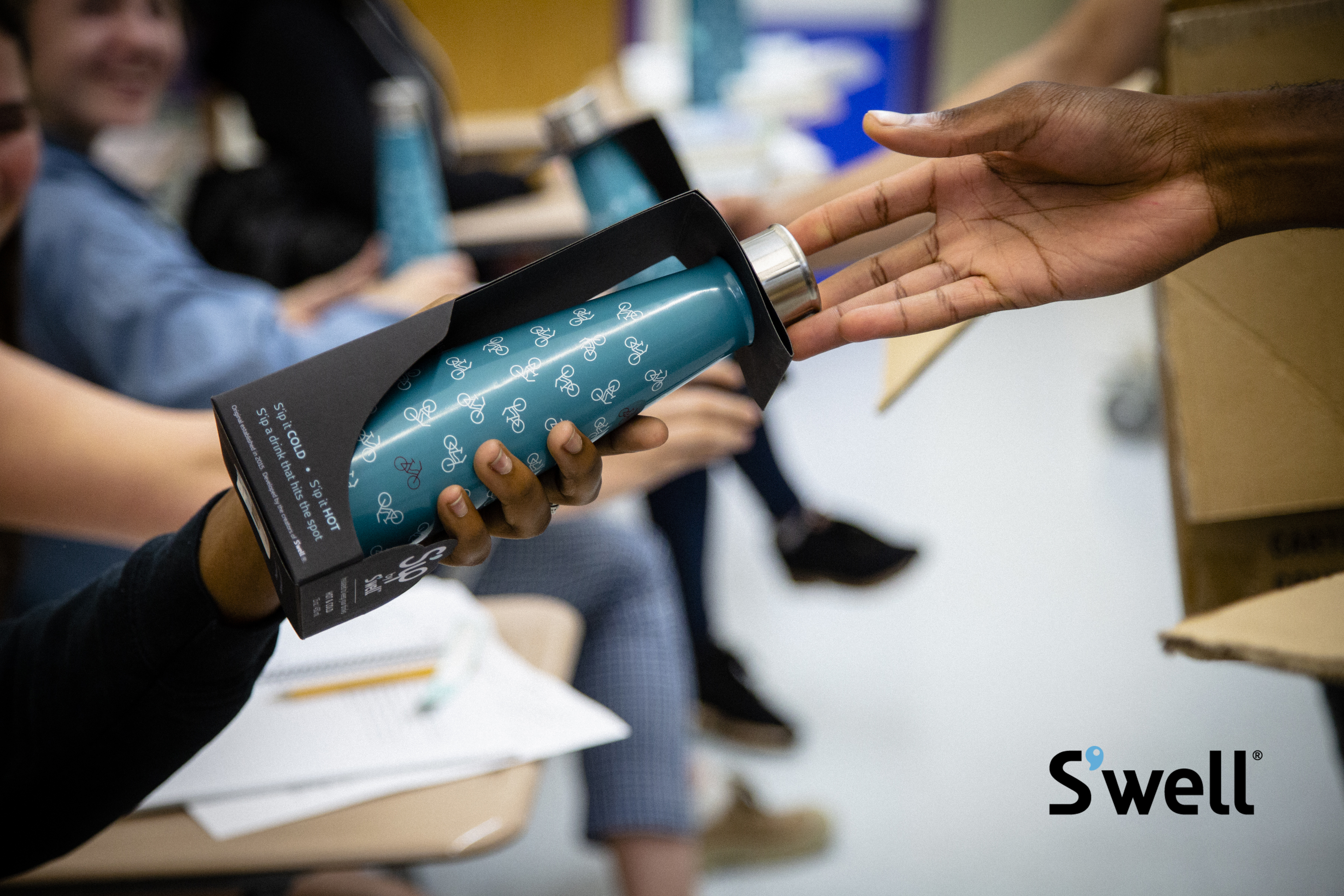
S’well was founded in 2010 with the mission to rid the world of single-use plastic bottles by creating a product that looked better, worked harder, and inspired consumers to do more good in the world. To extend its Million Bottle Project goals to displace 100 million bottles by 2020 and engage a powerful new audience, S’well, in partnership with the NYC Mayor’s Office of Sustainability (MOS) and the NYC Department of Education’s (DOE) Office of Sustainability, launched a multi-channel campaign helping NYC public school students reduce plastic waste through advocacy and action. With single-use plastics a major source of preventable waste in NYC, MOS recognized the unique moment to collaborate with new stakeholders to engage New Yorkers, reduce this pernicious problem, and deliver on NYC’s Zero Waste and behavior change goals. Consequently, S’well’s partnership helped launch the NYC-led BRING It campaign that jumpstarted a three-phase, S'well student sustainability initiative.
Goals:
Create Awareness. Develop a multi-pronged communications and education program, extending S’well’s visibility as a responsible business advocate, while supporting community action and positive behavioral change.
Extend Network & Program. Extend relationships for S’well and the MOS to create impact, driving conversations around sustainability and empowering today’s youth.
Drive Impact. Develop and implement measurable change in the way NYC residents think about single-use plastic bottles and waste with a focus on the city’s future leaders - students.
Through a targeted, three-phase campaign, S'well created an opportunity to tap 1.1 million public school students, a vast administrative network and new nonprofit partners to drive awareness and powerful engagement in S'well's hometown tied to minimizing single-use plastic bottle consumption.
PHASE 1: Launch
Timed to NYC Climate Week, S’well worked closely with the Mayor’s Office of Sustainability and Department of Education's Office of Sustainability to ensure all 320,000 bottles reached students in 690 schools along with posters and personalized stickers on one day.
A New York Times exclusive kicked off the week with widespread coverage in regional media outlets. Social media (via S’well’s channels and MOS’s public outreach and engagement arm, GreeNYC), video content and site pages offered co-branded resources. Students, the community and national audiences were encouraged to get involved and take action through week-long programming, stats and the Million Bottle Project pledge.
PHASE 2: Education + Thought Leadership
To extend programming and ensure engagement for the program district-wide, S'well engaged the district's 1500 sustainability coordinators, participated in grades 1-8 school grant programming and launched its first Earth Day Design Challenge.
The Earth Day Design Challenge invited students to answer questions and submit drawings tied to sustaining positive change and creating a waste-free world. Hundreds of submissions were received over a four-week period from students of all ages. Eleven finalists were chosen with one winner’s design selected to inspire the 2019 S’ip by S’well Earth bottle design, with 100% of proceeds going back to the Department of Education's sustainability programming. Finalists were celebrated at the Bloomingdale’s NYC Flagship store where their art was prominently displayed for two weeks as part of the "Good for the Globe" pop-up activation.
S'well also participated in the NYC Department of Education's Sustainability Showcase to highlight the 2019 Design Challenge winners' inspirational work, and further promote S'well's Million Bottle Project and the overall campaign.
PHASE 3: World Oceans Day and Beyond
As part of S’well’s annual programming around World Oceans Day, the Earth Day Design Challenge finalists were able to take part in S'well's sustainability non-profit partner Lonely Whale’s Ocean Heroes NYC Meetup on the UN Peace Boat, an experiential international NGO promoting sustainability and human rights. During the event’s ocean advocacy programming, S’well hosted an art and inspiration workshop based on the 2019 Earth Day Challenge for the students attending. The challenge winner also attended Lonely Whale’s internationally recognized Ocean Heroes Bootcamp in Vancouver along with students from 22 states and 10 different countries.
As a B2B touchpoint, executives also participated in key speaking engagements, including at the Sustainable Brands Flagship Conference and Consensus Great Brands, talking about the influence of this student advocacy program, as well as promoting the overall power of public and private sector partnerships creating maximum impact for change.
While S’well has traditionally been known for the style and performance of our product, this campaign allowed us to engage consumers with our sustainable mission, while empowering NYC youth to take action. It also provided a blueprint on how partnerships between public and private sectors can work, proving the power of collaboration in tackling immense environmental challenges. Results included:
Introduced S’well to 1.1 million public school students, 1500 school administrators and 1500 sustainability coordinators, while supporting the city’s Zero Waste goals
Distributed S’well products to 323k+ students across 5 boroughs + 690 schools, helping to displace 54 million single-use plastic bottles
Phase One alone secured 170+ media mentions + a NYT exclusive, resulting in 195MM impressions across broadcast, print and digital, with $575,000+ in earned media and garnered 1.25 million+ social impressions, resulting in 87,000+ engagements across Facebook, Instagram, YouTube + LinkedIn
6,000+ visits to BRING IT NYC program landing pages
98.9% positive/neutral sentiment across media coverage
Secured hundreds of Design Challenge submissions from all grades and boroughs
A MOS impact report revealed that six months later: nearly 3 in 5 students recalled receiving a water bottle at school, among those who remember, 89% use it at least sometimes; students who use both single-use and reusable bottles are using reusable bottles more often, particularly true for younger students (aged 13-15) where usage increased from 56% in 2018 to 64% in 2019
Received 300+ inbound queries from other schools, parents and national organizations about extending the program






